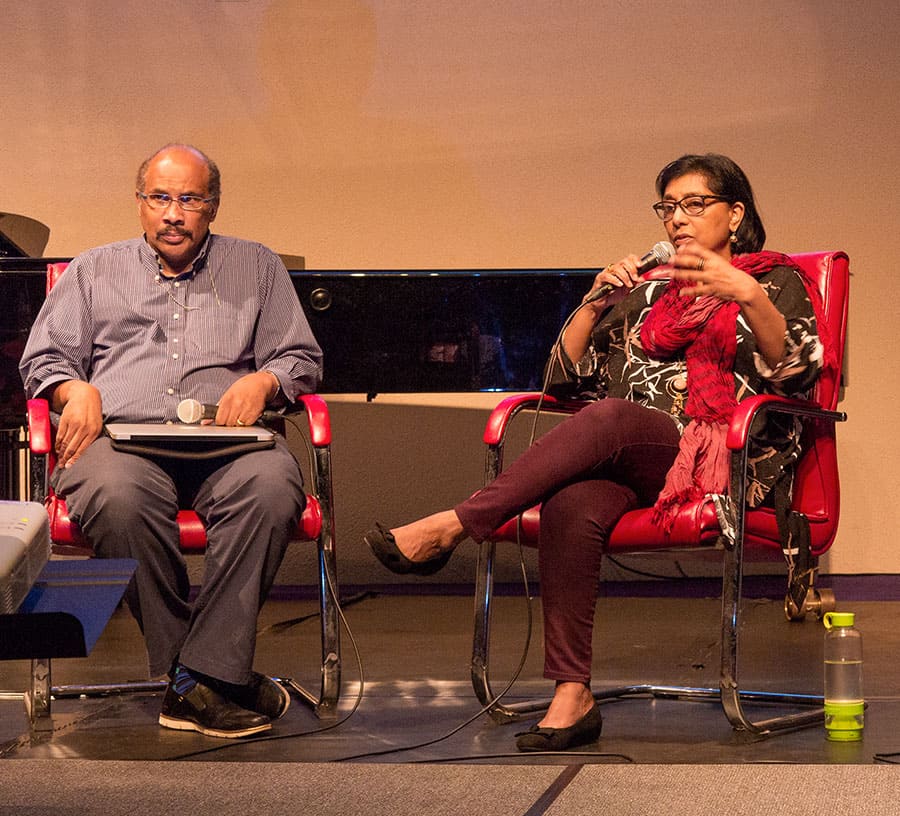
Above: Martin Raymond and Josanne Leonard host the discussion on Copyright in the Digital Age at NAPA. Photo by Mark Lyndersay.
BitDepth#1130 for February 01, 2018
It might seem surprising, but conversations about copyright, in music and particularly in Carnival, continue with no apparent resolution in sight.
A week ago, a small group of industry professionals gathered to listen to Clyde McKenzie, a Jamaican industry entrepreneur and Professor Kienda Hoji, a practising lawyer and educator in the field, who joined proceedings via a spotty internet connection.
McKenzie reviewed the state of affairs to date, recounting the revolution in file sharing that crippled the established music industry in the late 20th century, the platforms that arose, the status of play, with streaming increasingly commanding listeners and the dramatically diminished returns for creators and performers that’s resulted.
“Once the tour was a promotion for selling records,” McKenzie said, “but now the reverse is true. In Jamaica, artists didn’t make much from their recorded product, so they toured to make their money. Now it’s the norm.”
McKenzie also worried about the excessive clamping down on experimentation that’s accompanied new copyright regimes.
“A more permissive copyright environment is present in Jamaica,” he noted.
“People will borrow a lot in the creative sense, but they really don’t pay back until money is made from a successful production.”
Copyright, Hoji observed, has largely been hijacked by powerful industry forces and rarely seems to reward artists, which it was created to do. Creators in the music industry rarely have full control or ownership of their creations and business interests want return on investment.
Moral rights, which are focused on the creator, has notably not been adopted by the US, which continues to resist this aspect of copyright law.
TT operates with a copyright law that’s based on legislation first passed in the UK in 1956. It’s been amended since proclamation, but as Hoji noted, “We are trying to regulate 21st century reality with laws that were created for the creative environment of the 1700’s.”
The Caribbean does not have a robust history of protecting and prosecuting its rights to intellectual property, according to McKenzie.
“The determination of who owns what tends to be decided outside of the region.”
But when those decisions run in favour of regional creators, the returns are significant. McKenzie noted the example of Lord Creator, a Trinidadian who wrote prolifically in Jamaica whose song Kingston Town was picked up by UB40 and became a hit. Creator, whose fortunes had diminished at the time had returned to Trinidad, but the success of the song bankrolled his return to Jamaica.
“A little piece of your work used in a popular song could be your payday for the rest of your life,” McKenzie said.
That little piece, according to Hoji, is often decided in court and depends on how recognisable the snippet of melody or lyric is, sometimes through a field now known as forensic musicology.
Once identified as a legally defined “substantial part” a creator can benefit greatly from the returns on a popular work.

Heather Baldwin McDowell raises questions at the copyright discussion. Photo by Mark Lyndersay. Click to enlarge.
The discussion then turned to arranger Leston Paul, seated front row in the audience, as a conversation about one of his biggest hits, his work on Arrow’s Hot, Hot, Hot stirred.
“The amount of work that arrangers did over the years,” asked Paul, “we created the music that made hits for decades, where do I stand as being part of the money that was generated from those works?”
How that music is created greatly influences the payout participation from a successful song.
Some calypsonians were said to come to the studio with lyrics and expected the arranger to come up with backing. Others were able to sing to a recognisable melody, establishing musical authorship.
Today, entire songs are built as ’riddems’ and popular singers are invited to ride them, putting a stamp of additional authorship through lyric and arrangement contributions to the works.
Hoji was surprised to discover that some TT riddems charge performers to use the works, another example of the region going its own way creatively.
“Let’s agree as soon as possible after creation how the work is split in terms of creativity,” Hoji advised.
“It’s challenging to work that out long after the fact and once the track starts to be successful all kinds of people start coming out of the woodwork after to claim credit. It’s always harder to establish those splits after the fact, particularly for popular songs.“
”Success is always your greatest enemy.“

